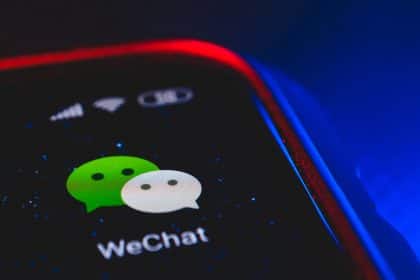[ad_1]
The implication of the WeChat ban largely implied that U.S. businesses cannot transact or do any business with this social messaging app.
With the pronouncement of the United States Department of Commerce with respect to the Tencent Holdings Ltd (HKG: 0700) WeChat ban on Friday alongside ByteDance-owned TikTok, new developments have emerged to help upturn the ban. While the administration has made it known that it approved the ByteDance deal with the Oracle Corporation (NYSE: ORCL) and Walmart Inc (NYSE: WMT), WeChat users have sought legal redress to upturn the administration’s ban on the social messaging app.
Per a Reuters report, Tencent has said that its WeChat app may struggle to attract new users following the ban and the company said in a statement filed at Hong Kong’s stock exchange late on Sunday, said it has been evaluating the potential impact of a ban since the U.S. Department of Commerce on Friday issued an order to block WeChat downloads on national security grounds.
While unable to bear the potential inconveniences the ban will cause, U.S. Magistrate Judge Laurel Beeler in California said in an order that WeChat users who filed a lawsuit “have shown serious questions going to the merits of the First Amendment claim, the balance of hardships tips in the plaintiffs favor.“ As CNBC reported, Judge Beeler’s preliminary injunction also barred the Department of Commerce’s order that would have barred other transactions with WeChat in the United States that could have degraded the site’s usability for current U.S. users.
As gleaned by CNBC, the move by WeChat users to seek legal redress to upturn the ban will spur a long legal battle as the department of Commerce’s officials said on a call with reporters.
WeChat Ban: What Limitations Were Placed
In the WeChat and TikTok ban pronouncement from the Department of Commerce (DOC) on national security concerns, the DOC Secretary Wilbur Ross noted that the actions proved that President Trump is determined to do everything in his power to guarantee the national security and protect Americans from the threats of the Chinese Communist Party.
According to the DOC, any service to distribute or maintain the WeChat mobile applications, constituent code, or application updates through an online mobile application store in the U.S. were banned with effect from Sunday the 20th of September, an order that’s now been temporarily shoved aside by Judge Beeler.
In addition, the department of commerce reiterated that transactions involving content delivery network services enabling the functioning of the apps in the U.S., as well as hosting services enabling the app’s operations in the U.S. are prohibited. The implication of the WeChat ban largely implied that U.S. businesses cannot transact or do business with the social messaging app whose users in the U.S. is a sizeable number to how widely used it is in China.
With the entire banning fiasco turning into a legal battle, the DOC’s promise to impose more restrictions as the days goes by may also be one of the many decisions users may have to wait to get clarity on as a more amicable solution is sought, as Tencent noted it will continue to negotiate with the U.S. government.

Benjamin Godfrey is a blockchain enthusiast and journalists who relish writing about the real life applications of blockchain technology and innovations to drive general acceptance and worldwide integration of the emerging technology. His desires to educate people about cryptocurrencies inspires his contributions to renowned blockchain based media and sites. Benjamin Godfrey is a lover of sports and agriculture.
[ad_2]
Source link



